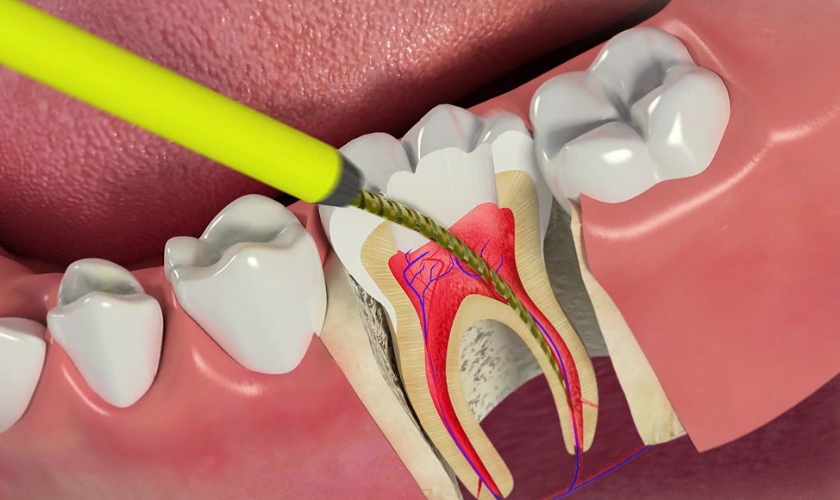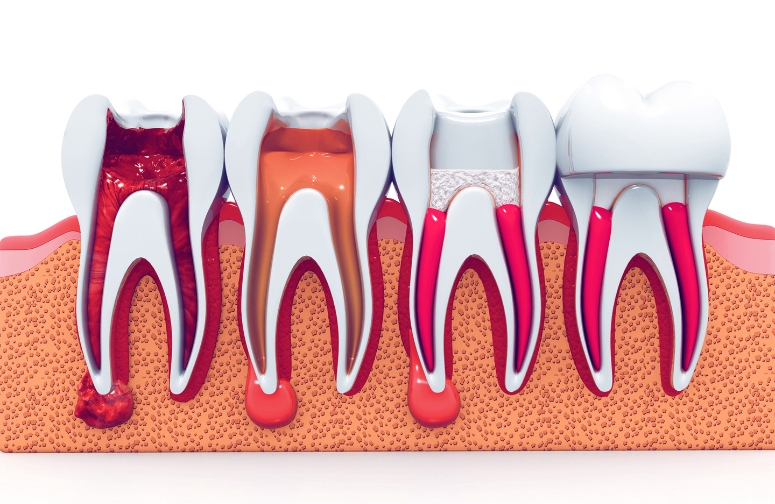
Toothaches are no fun. But the thought of a root canal to address the pain can be even more unsettling, often conjuring images of excruciating dental procedures from years past. However, modern dentistry has come a long way, and root canal therapy is now a relatively painless and effective way to save a damaged tooth.
This blog sheds light on the truth behind root canal myths, explores the realities of the procedure, and explains how modern techniques ensure patient comfort.
Root Canal Therapy: Demystifying the Procedure
A root canal is a dental procedure used to treat a deeply infected or damaged tooth. The pulp, the inner part of the tooth containing nerves and blood vessels, becomes inflamed or infected due to various reasons, such as deep decay, cracks, or trauma. This inflammation causes the intense toothache associated with a damaged tooth.
During a root canal, the dentist removes the infected pulp, cleans the inside of the tooth, and seals it with a filling or crown. This eliminates the infection and prevents further damage, ultimately saving the tooth and alleviating the pain.
The Root of the Myth: Why Root Canals Have a Bad Reputation
The traditional image of a root canal evoking fear and anxiety likely stems from experiences of the past. In the past, root canal procedures were performed without the advanced anesthetics and tools available today. This could result in discomfort during the procedure.
However, modern dentistry offers significant advancements that make root canals a much more comfortable experience. Here’s why the fear of pain associated with root canals might be unfounded:
- Local Anesthetics: Modern dentistry utilizes highly effective local anesthetics to numb the area around the tooth, effectively eliminating any pain during the procedure.
- Advanced Techniques: Dentists now use minimally invasive techniques and specialized instruments for root canals, making the process faster and more comfortable.
- Pain Management: Dentists are committed to patient comfort and will readily provide additional pain management options like nitrous oxide (laughing gas) or oral sedation if needed.
What to Expect During a Root Canal: A Step-by-Step Guide
Understanding the different stages of a root canal can help alleviate anxiety:
- Consultation & Examination: During a consultation, the dentist will discuss your symptoms, conduct an examination, and take X-rays to determine if a root canal is necessary.
- Local Anesthetic: A local anesthetic will be administered to numb the area around the tooth.
- Accessing the Pulp: The dentist will create a small opening in the crown of the tooth to access the infected pulp.
- Removing the Pulp: Using specialized instruments, the dentist will carefully remove the infected pulp tissue.
- Cleaning and Disinfection: The inside of the tooth, including the root canals, will be thoroughly cleaned and disinfected to eliminate any remaining bacteria.
- Filling and Sealing: Once the cleaning and disinfection are complete, the dentist will fill the empty canals with a special material and seal the opening in the tooth.
- Crown Placement (Optional): In some cases, depending on the extent of damage, the dentist might recommend placing a crown on the tooth to restore its strength and function.
Post-Procedure Care and Recovery: Minimizing Discomfort
While the root canal itself should be pain-free, you might experience some mild sensitivity or discomfort after the procedure. This is typically temporary and can be managed with over-the-counter pain medication as prescribed by your dentist. Following your dentist’s post-procedure instructions will ensure a smooth recovery.
Modern Dentistry: Making Root Canals Comfortable and Effective
Modern dental advancements have transformed root canal therapy into a safe, effective, and relatively painless procedure. Here are some key factors contributing to patient comfort:
- Advanced Anesthetics: Highly effective local anesthetics ensure a completely numb area around the tooth, eliminating any sensation during the procedure.
- Dental Technology: Sophisticated tools and equipment, like rotary instruments and advanced imaging technology, allow for faster, more precise, and less invasive procedures.
- Dentistry Expertise: Modern dentists are highly skilled and experienced in performing root canals, making the process efficient and patient-focused.
Benefits of Root Canal Therapy: Pain Relief and Saving Your Smile
Despite the initial anxiety, opting for root canal therapy offers significant benefits:
- Pain Relief: The primary benefit of a root canal is the elimination of tooth pain caused by the infection. Addressing the infection at its source provides immediate and long-lasting pain relief.
- Saving Your Tooth: Root canal therapy allows you to preserve your natural tooth. This is crucial for maintaining a healthy bite, preventing teeth from shifting, and preserving your overall oral health.
- Improved Function: A healthy, restored tooth allows you to chew comfortably and speak clearly without any pain or discomfort.
- Preserving Your Smile: Saving your natural tooth contributes to maintaining a complete and aesthetically pleasing smile.
- Long-Term Solution: With proper care, a root canal-treated tooth can last for many years, providing a long-term solution for a damaged tooth.
Alternatives to Root Canal Therapy: Understanding Your Options
While root canal therapy is often the preferred treatment for a severely infected or damaged tooth, there might be alternative options in certain situations. Here’s a brief overview:
- Fillings: For less severe cases of tooth decay, a dental filling might be sufficient to address the issue and prevent further damage.
- Extraction: If the tooth is severely damaged beyond repair or the infection is too extensive, extraction might be the only viable option. However, an extraction can lead to complications if not replaced with an implant or bridge, potentially affecting your bite and overall oral health.
Ultimately, the best course of action will depend on the specific condition of your tooth and your dentist’s evaluation. It’s crucial to discuss your options with your dentist to determine the most suitable treatment for your individual case.
Taking Care of Your Teeth: Preventing the Need for Root Canals
While modern dentistry makes root canals a comfortable and effective procedure, prevention is always the best course of action. Here are some essential practices to maintain healthy teeth and minimize the risk of needing a root canal:
- Brushing & Flossing: Regular brushing twice daily and flossing once daily removes plaque and bacteria that contribute to decay and infection.
- Regular Dental Checkups: Schedule regular dental checkups and cleanings for early detection of cavities or potential issues that could lead to the need for a root canal.
- Healthy Diet: Maintain a balanced diet low in sugar and acidic foods to avoid damaging your teeth and promoting tooth decay.
- Protective Habits: Wear a mouthguard during sports activities to protect your teeth from injury. Avoid using your teeth for tasks like opening bottles or chewing on hard objects.
Don’t Fear the Root Canal, Embrace a Healthy Smile
Root canals have come a long way, and modern dentistry offers a comfortable and effective solution for saving a damaged tooth. Understanding the benefits of root canal therapy and the advancements in dental technology can alleviate anxiety and encourage you to seek treatment when necessary. Prioritizing good oral hygiene practices can significantly reduce your risk of needing a root canal in the first place.
Remember, early detection and treatment of dental problems are key to maintaining a healthy smile. If you’re experiencing any tooth pain, don’t hesitate to schedule an appointment with your dentist. Addressing the issue promptly can prevent further complications and ensure a pain-free, healthy smile for years to come.





